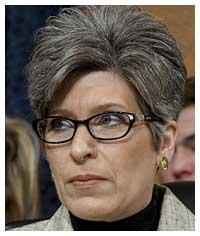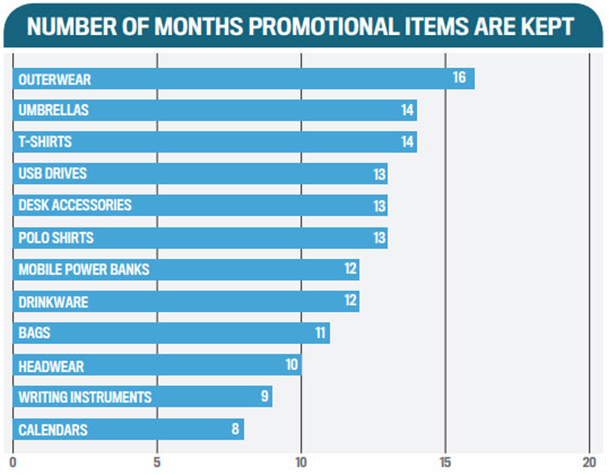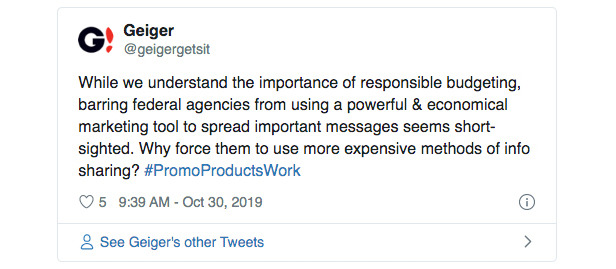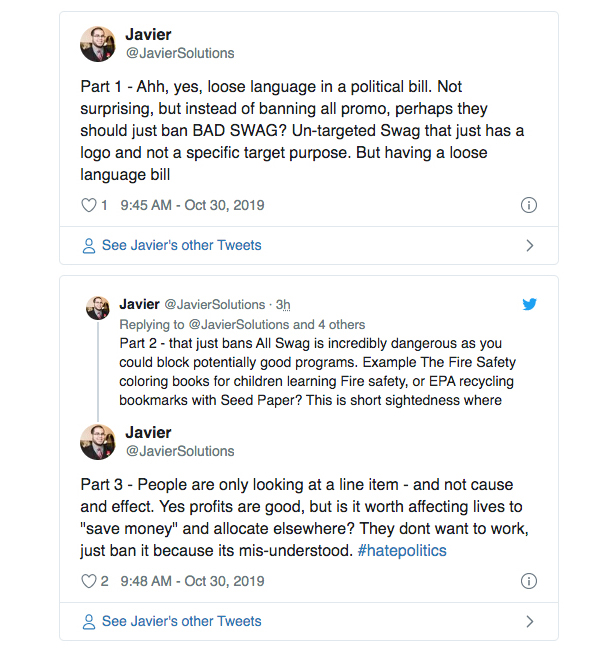News October 31, 2019
Senator Wants To Ban Federal Agencies From Buying Promotional Products
Sen. Joni Ernst says "it’s time to bag the swag."
Updated 3:09 p.m. ET, October 31, 2019:
 U.S. Sen. Joni Ernst, a Republican from Iowa, is introducing legislation that would, in part, prohibit federal agencies from purchasing and distributing branded merchandise/promotional products, unless explicitly authorized by statute.
U.S. Sen. Joni Ernst, a Republican from Iowa, is introducing legislation that would, in part, prohibit federal agencies from purchasing and distributing branded merchandise/promotional products, unless explicitly authorized by statute.
In introducing the Stop Wasteful Advertising by the Government Act, or SWAG Act, on Tuesday, Ernst singled out buttons, coloring books, fidget spinners, key chains, can coolers and stickers as examples of items that government agencies would be barred from buying if her bill becomes law. Indications, however, are that the prohibitions would extend to a wider spectrum of promotional products. Medals awarded for sacrifice or meritorious service would still be allowed under the legislation. “It’s time to bag the swag,” Ernst said in a statement.
Taxpayers are being haunted by Washington’s spooky spending on pricey PR & advertising campaigns, costing taxpayers in #Iowa & across the country $1.4B+ each year. We need to pass my SWAG Act & end this reckless spending. #MakeEmSqueal pic.twitter.com/2OtO6NiCoS
— Joni Ernst (@SenJoniErnst) October 29, 2019
Ernst’s proposed federal clampdown on promotional products comes as part of her SWAG Act’s broader mission to reduce what she said is the $1.4 billion in taxpayer money that federal government agencies spend annually on public relations and advertising campaigns. Ernst said the legislation would also:
• Prohibit the federal government from spending money to create a “mascot” to promote an agency, program, or agenda, unless such a character is explicitly authorized by statute—like “Smokey Bear” or “Woodsy Owl.”
• Permanently prohibit public relations and advertising for purely propaganda purposes, allowing exceptions for military recruitment and other specific functions that are authorized by statute.
• Require agencies to publicly disclose spending on public relations and advertising.
$1.4 billion in taxpayer money is spent annually by government agencies on PR and advertising campaigns—twice the amount dedicated to breast cancer research. It’s time to bag the swag. Today I introduced a bill to end this reckless spending. https://t.co/brOpjY9TZa
— Joni Ernst (@SenJoniErnst) October 29, 2019
“As an Iowa State Cyclone fan, I’ll be the first to say that mascots can be fun. But there is no justification for spending a quarter of a million dollars in taxpayer money on mascots and millions more on swag,” said Ernst. “These costs come at the expense of real national priorities.”
In announcing her legislation, Ernst pointed out what she said were examples of wasteful government agency spending on merchandise. “Government agencies are…spending millions of taxpayer dollars on tote bags and swag, including: $605,000 for coloring books; $60,000 on key chains; $33,000 for snuggies; $17,000 for (can coolers); and $16,000 for fidget spinners.”
Ernst also took issue with what she said was the State Department spending $630,000 to buy fake Facebook fans and paying to send social media influencers on a “two-week junket” from abroad to the location of popular U.S. television shows to promote American values.
After Counselor broke the news of Ernst’s plan late Tuesday to the promo industry, executives in the ad specialty space were swift to react, saying the proposed ban betrays a lack of understanding of the value promotional products bring to helping private and public entities cost-effectively achieve important objectives.
“Promotional products are a cost-effective way to communicate, build momentum, guide behaviors and educate people about services and opportunities offered by government agencies at all levels,” said Timothy M. Andrews, President and CEO of the Advertising Specialty Institute (ASI), a U.S.-headquartered organization and technology provider that serves a network of 23,500 suppliers, distributors and decorators of logoed promotional products in 55 countries. “We plan to work with industry leaders to explain forcefully the power of our industry – to educate this legislator and others on the folly of this proposal and the economic power and world-wide reach of our industry and its products using long-proven ASI research. Our efforts will include collaborating with PPAI leadership and ASI members to make every effort to stop this ban in its tracks.”
Here is a link to ASI research that proves the longevity and power of promotional products in marketing campaigns: https://www.asicentral.com/news/web-exclusive/january-2019/2019-ad-impressions-study/.
ASI’s 2019 Ad Impressions Study showed that the cost per impression of promotional products can be as low as 1/10 of 1 cent – lower than nearly any other advertising medium. As importantly, consumers under 55 prefer promo products over all other mediums for advertising, including newspapers, radio, magazines, television, internet and mobile. Consumers are also 2.5 times more likely to have a positive opinion of promotional products compared to online advertising. And, critically, promo products have real staying power, meaning they can help power essential awareness-raising initiatives government agencies and other entities might be advancing:

“It would be counterproductive for Congress to pass a bill that would eliminate any opportunity for the government to use promotional products in a powerful and effective manner,” said Paul Bellantone, President and CEO of Promotional Products Association International (PPAI), an association serving more than 15,500 corporate members of the promotional products industry. “It will take a concerted effort by the entire industry – including practitioners, companies and representative national and regional trade organizations – to work together to advocate for our businesses, products and profession."
Industry leaders were encouraging promo pros to take action by contacting Ernst and her bill’s co-sponsor, Sen. Rand Paul of Kentucky, and one’s own senators and representatives. PPAI was offering a form through which industry pros could contact legislators.
Rose Wallin, a distributor from Ernst’s Iowa who is affiliated with Top 40 distributorship AIA Corporation (asi/109480), questioned if her senator understands the economic ripple effect that a ban on promo products could have in the Hawkeye State – and the entire country. “This affects us as distributors, as many of us are small businesses, and it also then trickles down to suppliers that wouldn’t be getting orders from us…ultimately this could impact jobs,” Wallin said.
Larry Cohen, CEO of Top 40 distributor Axis Promotions (asi/128263), encouraged promo professionals to educate legislators and the public about the value of promo products and the size of the ad specialty market – a $24.7 billion industry in 2018 that creates livelihoods for more than 500,000 people. “These efforts targeting our industry seem to pop up periodically as some view promotional products as wasteful and unnecessary until we can get people to focus on them as part of marketing and advertising and not just a giveaway,” Cohen told Counselor.
Some promo professionals took umbrage with Ernst’s targeting of branded merchandise, saying that the senator is a hypocrite. “She has used funds for merchandise to elect herself and promote causes she believes in,” Memo Kahan, president/owner of Top 40 distributor PromoShop (asi/300446), told Counselor. “I take offense to her singling out our industry. Does she not have better things to do? The U.S. spent $4.4 trillion dollars in 2018 and she is concerned about $1.4 billion – or .0318%? There are so many things Iowa needs, and Ernst is focused on this?” Images on Ernst’s Instagram show her sporting branded gear/promotional products:
View this post on Instagram
View this post on InstagramPork belly on a stick! So good! 🐽🐷🥓 #NothingCompares to @iowapork! #iowastatefair #iowa #ISF2019
“Specifically calling out promos as a way to cut spending doesn’t make sense when there are more costly and less effective advertising mediums that could also be considered,” Melissa Ralston, chief marketing officer at BIC Graphic North America (asi/40480), told Counselor. “That’s especially so when you consider the power that promotional items have in connecting people to a memorable experience or message, and the 500,000 jobs our industry supports.”
Promo professionals took to social media platforms to react to Ernst’s proposed ban. Top 40 distributor Geiger opined (asi/202900):

Meanwhile, Javier Melendez, a promo sales professional speaking personally and not on behalf of his company, issued a series of tweets detailing his perspective:

On LinkedIn, Kelly Stone commented on the potential negative financial impact Ernst’s legislation could have on promotional products companies. The owner of the distributorship The Idea Box powered by Proforma (asi/300094) said, in part: “Not only our government but all companies need to be judicious in the way they spend their money – but people/companies have choices in how/why they spend their money. Banning this goes against our capitalist backbone.”
Kevin McHargue, a partner at PromoPlacement, a recruitment firm that serves the promotional products industry, commented: “While I am all for a clampdown on wasteful government spending, I believe Senator Ernst’s efforts are uneducated and misguided. Promotional products work to carry a wide range of messages directly to the target market. From controlling drug use to educating seniors on benefits to commemorating a visit to an historical location, promotional products put the message in target recipients’ hands. In doing so, seeds are planted, messages are conveyed, and behavior is modified. Promotional products are an effective medium for government, just as they are for business.”
